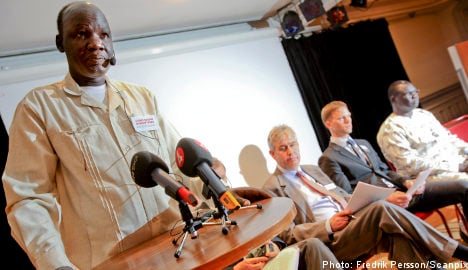The claims centre around the period between 1997 and 2003 when ten thousand people were killed and nearly 200,000 were forced to flee to southern Sudan.
Sudanese troops, in collaboration with militias, attacked and drove away the civilian population in areas where companies could extract oil, according to a report that some backed by about 50 NGOs in the European Coalition on Oil in Sudan.
One of the authors of the report, Egbert Wesserlink, stresses that Lundin Petroleum did not carry out the suspected abuse. According to him, they instead hired the Sudanese officers.
“Our conclusion is that Lundin contributed to there being war in the area and not to peace and development as they themselves claim,” he told Ekot.
In response, Lundin Chairman Ian H. Lundin said in a statement, “There is no new evidence in this report. The report repeats the conclusions, innuendo and false allegations based on partisan and misleading information that was rejected during that time in a document entitled ‘Lundin Oil in Sudan, May 2001.'”
Oil companies Petronas and OMV were Lundin’s partners in Sudan and the report asserts that companies had earlier received help by Sudanese army and loyalist militias to fight other militias who had tried to stop oil extraction.
“It is not credible when Lundin said that they were unaware of the atrocities and war in the region,” said Wesserlink, referring to Lundin Petroleum repudiating the accusations in an email.
Shane Quinn, program officer at the Swedish Foundation for Human Rights, told The Local that it is good that this report comes out now, even if it addresses events that ended seven years ago.
“There was an earlier report about them forcibly moving people,” Quinn told The Local. “They’ve always gotten off scot-free and there has been extremely little media coverage, maybe due to the Carl Bildt connection. It has always struck me as strange since Sweden has this big human rights portfolio.”
Swedish foreign minister Carl Bildt was on the board of Lundin until 2006.
Shane Quinn added that it was worth investigating the coalition behind the report in terms of their agenda and whether they had a religious lobby.
The allegations date back to the period after 1997 and when Lundin Oil, a firm that pre-dated Lundin Petroleum and has since been sold to Canadian Talisman, owned rights to drill in the area.
Neither Lundin Oil nor Lundin Petroleum have extracted any oil from Sudan, while they have carried out a number of test drillings, after the signing of a peace agreement in January 2005.
Sudan’s civil war first broke out in 1955 and continued until 2005 after an interval of almost nine years from 1972. The conflict, between the Muslim north and Christian south, is reported to have displaced 4 million southerners and claimed a total of 1.1 million lives.



 Please whitelist us to continue reading.
Please whitelist us to continue reading.
Member comments